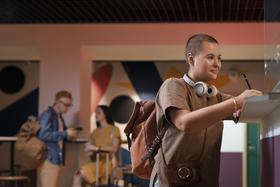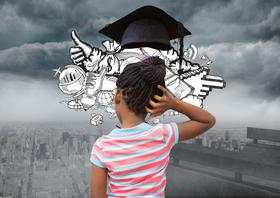Read more details about Idyllwild Arts Academy on their 2025-26 profile page.
Reflections and Advice:
1.) What do you think makes your school unique relative to other boarding schools?
I have never been to another boarding school, but I feel like the emphasis on the arts and arts education makes a huge difference in setting Idyllwild apart from most other schools. It is a school that encourages individuality and self expression. In my experience, students are seldom put down/criticized/ostracized for their gender, race, sexual orientation, beliefs, or the way they dress. This acceptance is extremely important for a young student going through this time in their lives, where they simply need space to be themselves in order to understand who they are.
2.) What was the best thing that happened to you in boarding school?
Work hard, play hard! The Idyllwild community is a group of people who not only know how to do some intensive training, but also know how to have a lot of fun! Even though I'm not 100% as satisfied with myself as a musician as I'd like to be, I highly doubt I'd be half as experienced as I am today if I hadn't gone to Idyllwild. On top of that, I've discovered my love and abilities for another art form, and I'm totally proud of being a little different. There are adults who criticize me for not taking a career path that makes me more money, or getting a degree in something "proper" like law, medicine, engineering, etc, but Idyllwild has made me see from a young age, the importance of art in our daily lives. It's not about the money, or how much other people respect my career path. Life is too short to spend it slaving over something you don't enjoy just to earn extra money.
3.) What might you have done differently during your boarding school experience?
I'm a believer that every choice we make, good or bad, contributes to learning about ourselves and who we are. I don't really think about changing anything, especially now that it's been 9 years since my graduation. No regrets! If you make a bad decision that led to something unfortunate, take what you can from that and think about how to improve yourself right then and there. You only get one 4-year period of your life where you can be in high school, and if you choose to spend those years in Idyllwild, do the best that you can do to learn from any mistakes while you're there, rather than look back some day and wish that you could go back and change something.
4.) What did you like most about your school?
Being in an environment that encouraged being yourself, and not discriminating against others. Not that other schools don't endorse this as well, but students are more willing to see past differences in an artistic community. As quirky arts kids, many of us probably WERE the outcasts where we originally came from. For example, I was an "orchestra nerd" in middle school, I never had an up-to-date fashion sense, I was not athletically inclined nor on all the sports/cheerleading teams that many of my school mates were on, and I certainly never sat at the "popular kids" lunch table. When I went to Idyllwild, all of those things that I was so conscious about disappeared. There were no popular kids...we were ALL arts dorks in some way, and I was among a whole department full of orchestra "nerds". With only about 300 students in the whole school, we all knew each other and it was way less likely that I would feel unwelcome at any lunch table or friend group.
5.) Do you have any final words of wisdom for visiting or incoming students to your school?
The rules are there for a reason, mostly to protect US, the students. Don't break the rules, just don't! I've never witnessed a situation where breaking the rules were worth it, and most of the time, the student was the one who ended up being hurt in some way. Once we're adults and old enough, we have the rest of our lives to break rules and decide if we want to suffer the consequences, but Idyllwild is not the place to do silly things like sneak off and smoke and drink and do drugs. That momentary feeling of fun and satisfaction from being rebellious is never worth what you feel later when you get caught, or take a trip to the hospital, or even get expelled. Worst of all, word spreads fast in a small school.
Maybe some adults disagree with me, but as people say: there's a time and place for everything...and it's called college!
Academics:
1.) Describe the academics at your school - what did you like most about it?
As a somewhat slow learner, it was very beneficial for me to be in smaller classes, where it was at most 15-20 students to one teacher. This allowed for teachers to have almost a personal understanding of each of their students, which creates a much more productive learning environment for the students. I was able to keep up a very high GPA thanks to the opportunity to learn at a comfortable pace without the courses being less rigorous than that of public schools.
Athletics:
1.) Describe the athletics at your school - what did you like most about it?
Things might be different now, but in the early 2000s, we did not have a set PE program/class period, but the great part of that was that PE was a credit that required self motivation. This meant we could choose a physical activity that we were more likely to enjoy, such as taking a dance class, joining a club, taking long hikes on the weekends, swimming, or playing on the field with our peers. Before going to Idyllwild, PE classes mostly consisted of track and field, or team/ball games, which I was never good at. Constantly being last to be chosen for teams made me dislike getting exercise even more. Having the choice to do something that I felt like I could excel at did not feel so exhausting and depressing, AND I was able to get credit for it.
Art, Music, and Theatre:
1.) Describe the arts program at your school - what did you like most about it?
It is simultaneously very competitive and supportive. Most students are very intensely passionate about what they go to Idyllwild for, which pushed me and motivated me to work harder at my own art, but within the competitiveness, students also learn to become humble about learning from each other by seeing each other's work. I think that there are very few places where you can see music, dance, and theatre performances, go to a film showing, attend an art gallery, hear poetry readings, and more all in the same year in the same place. For free! There's so much that a student can be exposed to and stimulated by, and now as an adult, I see how important it is for an artist to enrich themselves with other types of art from their own. Ultimately, all arts are connected and it's so beneficial to see early on how they can work together.
Extracurricular Opportunities:
1.) Describe the extracurriculars offered at your school - what did you like most about it?
Most of the extracurricular clubs and organizations were non-exclusive, which gave us a chance to learn something that we maybe wouldn't have taken the effort to learn otherwise. For example, I have always wanted to learn how to dance, but was always hesitant to take classes because I felt like I was not good enough, or not as advanced as I should be for my age. But a club like Latin Dance club was made to be casual, and for people of every level, and therefore eliminated any pressure of being "good enough" or being graded. At the same time, I was still able to learn an entirely new skill that I never had before.
Dorm Life:
1.) Describe the dorm life in your school - what did you like most about it?
It was like one giant sleepover/summer camp. When you return "home" for the evening, many of your friends are there in the building. Unlike public school, seeing these friends outside of just the school hours created much deeper friendships. Also, being exposed to a college-like life 4-5 years prior to going to college really helped me mature and develop a better relationship with my family, as I came to understand not to take my time with my family for granted. It also made the transition to college much easier, and I did not struggle with the ups and downs of figuring out life on your own during my already busy freshman year of college.
Dining:
1.) Describe the dining arrangements at your school.
To be honest, I neither liked nor disliked the dining arrangements. On one hand, it was wonderful being able to have as much food as we wanted available as soon as I entered the dining hall, and to have the freedom to choose what I wanted to eat (no more parents telling us we can't combine butter and sugar simultaneously on a piece of toast!), but I did miss the food that was cooked at home. As a young teenager, there's still a childish part of yourself that still misses being fed your parents' cooking. In fact, I still miss it sometimes as a 27 year old!
Social and Town Life:
1.) Describe the school's town and surrounding area.
It's small, cozy, and homey. Over time, you start to know the owners of your favorite stores/restaurants and they start to know you. Idyllwild is a very intimate little place. There's also a lot of spectacular nature, not only around campus, but right inside campus. People pay to stay and vacation in Idyllwild, and we are lucky to be surrounded by it's "idyllic" environment everyday. Most students can't just go hike out to sit on a boulder under giant pine trees when they feel like they need to de-stress.
That being said, students who are used to or prefer large and busy cities may find it difficult to adjust to small town life. However, most of us won't be at Idyllwild forever, and there's always college to go off to. Our years at Idyllwild are short and go by fast, so savor them while you can!
2.) Describe the social life at your school - what did you like most about it?
Many people who graduate from public high schools talk about the people they knew as if they are some distant memories. All I can say is that some of my closest friends from 10 years ago are still my friends. I've been fortunate to run into some of them throughout the years, and despite a few years of not physically seeing each other, our meetings are exactly like picking up from a conversation that we left off no more than a few days ago.
Daily Schedule:
Weekday
7:00 AM
Wake up
7:30 AM
Breakfast
8:00 AM
Academic classes start
12:00 AM
Lunch
2:00 PM
Academic classes end (could be earlier or later, depends)
3:00 PM
Rehearsals, arts classes, practice hours
6:00 PM
Dinner
7:00 PM
Additional practice time, homework time, downtime with friends
10:00 PM
Curfew, phone time with family
11:00 PM
Finish additional homework, sleep
Weekend
9:00 AM
Wake up/sleep in
10:00 AM
Brunch, sign in
11:00 AM
Trips to town, club meetings, spend time with friends, hikes, practice, movie marathons, etc.
5:00 PM
Dinner, attend any concerts, finish any homework, dorm hangouts, sleepovers
Read more details about Idyllwild Arts Academy on their 2025-26 profile page.
Alumni Reviews Review School
Review
Description
Idyllwild Arts Academy's focus on the arts is well-known. Intensive training in a variety of artistic disciplines, such as dance, music, theater, visual arts, and creative writing, is integrated into the curriculum. Along with intensive. . .
Comprehensive Arts Education: Idyllwild Arts Academy's dedication to providing a comprehensive arts education is one of its standout features. The academy offers a wide variety of artistic disciplines, including music, dance, visual arts, drama, film. . .
The academy lays a lot of emphasis on encouraging its students' creativity, focus, and artistic expression. A strong academic program is combined with a demanding arts curriculum to give children a well-rounded education. Students are. . .
Show more reviews (20 reviews)
Recent Articles

Balancing Boarding Life
A clear, practical guide to balancing boarding life and independence, offering transition tips for students and families in 2025.

Balancing Boarding Life and Independence: Student Transition Guide
A clear, practical guide to balancing boarding life and independence, offering transition tips for students and families in 2025.

Why Consider Boarding School in 2025: Updated Benefits & Realities
Explore why boarding school remains a compelling option in 2025—academic excellence, global exposure, personal growth, and evolving financial aid make it a powerful choice.





